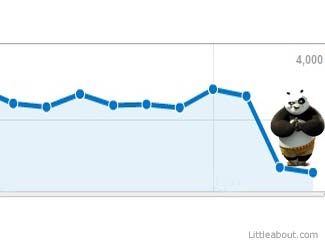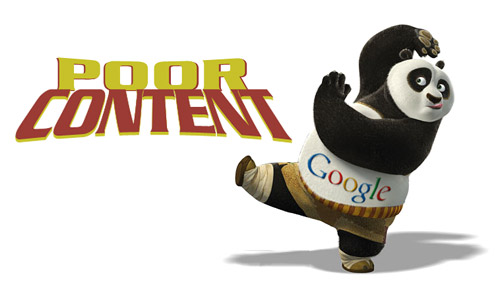- HubPages»
- Technology»
- Internet & the Web»
- Search Engines
Understanding How The Google Panda Update Affects Your Site
With the Google Panda update, many sites have seen their page rank and visitors decrease. Unless search engines rank your site high, steady or increased traffic is almost impossible. The update targeted sites with poorly written and outdated copy. This meant sites typically used to writing quick articles filled with keywords found themselves near the bottom of the search pile.

The Panda update has actually been a series of updates and tweaks with more on the way. While it has cleared many spam sites from the search engine ranks, the downside is many legitimate businesses and websites were washed away with them. Luckily, Google has stated exactly what they are looking so sites can plan and revamp accordingly.

What Google DOESN'T want
The first thing to take notice of is what Google doesn't want. Once you understand what aspects of your site Google penalized you for, the easier it is to fix the problem and start ranking higher again. Sites who have followed Google's advice have been quickly rewarded with higher page rank and increased visitors. Basically, if you take care of your site and follow the rules, you will do well.
Content Really Is King!
Content is the be all and end all of this update. While sites filled with nothing but advertising were cut out as well, content was the main factor in the Google Panda update. Your starting point for truly understanding why the update affected your site should begin with evaluating your existing content.
Content evaluations are broken down into two major categories: grammar and usefulness. Score high in both categories and you're set. Fail in one or both and your site will find itself struggling.

What does Google Panda look For?
The grammar aspects Google Panda took into consideration are as follows:
- Spelling
- Sentence structure
- Flow
- Awkward keyword placement
- Native language
Google Panda and Spelling
Spelling is probably the most obvious to catch. A few misspelled words won't hurt you. Google understands mistakes happen. Consistent spelling problems come off as unprofessional and hastily produced. In Google's eyes, this screams spam.
Google Panda and Sentence Structure
No one, not even Google, expects your sentence structure to be perfect. However, it should have basic noun/verb agreement, no fragments and few if any run-ons. Basic sentence structure helps the reader understand your content better, so they absorb the information easier.
Google Panda and Flow
The overall flow of the content is important as well. Stringing together a bunch of facts without any flow makes the content choppy and hard to digest. Since Google is after a visitor oriented, instead of search engine friendly, sites, flow is vital. If you have a hard time reading it out loud as if you were giving a speech, it needs more work.
Google Panda and Awkward Use of Keywords
While everyone has heard that keywords are important, awkward use of keywords does more harm than good. If the keyword doesn't fit into the flow of the article or content, don't use it. It is better to use a variation of the keyword than try to cram it in where it doesn't belong or make sense.
Google Panda and Native Language
Many people try to produce content that isn't in their native language, without being able to speak or write well in the other language. The result is articles full of the above issues. Sticking with a person's native language or using professional translation services works much better.

Other Factors Google Panda Considers
Google Panda also looks at the following factors to determine if content was truly useful or not:
- Article length
- Facts
- References and resources
- Original content
- Insightful analysis
- Article quality
- Share worthy
While article length isn't the most important factor, it makes a slight difference. An article that is too short is more likely to provide a teaser instead of any real information. It looks hastily put together and typically has readers moving on to content with more meat.
Facts are important. Content should always provide factual information. Visitors need a source they can trust. One way to help prove facts is with credentials, if you're an expert, or include references and resources with your content. The less visitors have to double check, the more likely they are to keep returning. Google Panda takes this into consideration.
Sites filled with duplicate or similar content have been hit hard by Google. Instead of rewriting on the same topic, Google wants original content. This doesn't mean you have to reinvent a topic, but it does mean taking a different approach. It can be as simple as expanding upon general topics, providing insightful researched analysis or ensuring all content is full of useful information.
The overall article quality is the most important aspect. Does the article seem to be well edited? Is it long enough to answer the searcher's question? Does the visitor stay to read the article or skip to a different website? Article quality keeps visitors on your site. Since Google Panda is using the views of visitors as part of the algorithm, it is important to impress visitors and write for them. The object is to provide “share worthy” content visitors will want to share with friends and family.
How To get Out of a Google Panda Crisis!
The best way to make certain your site meets all of the requirements is through professional copywriting. You save time and hassle by having your copy written correctly the first time. Exquisite Writing prides itself in being able to provide only the best copywriting for all types of websites. Whether you need rewrites of existing content or new content altogether, we are here to meet your Google Panda needs.

Tell us what YOU think...
Has Google Panda damaged your site's figures and performance?
This hub brought to you...
by Julie-Ann Amos, professional writer, and owner of international writing agency www.ExquisiteWriting.com
Why not create your own HubPages? It's fun and you can make revenue from Adsense and other revenue streams on your pages. JOIN HUBPAGES NOW - SIMPLY CLICK HERE...
This work is licenced under the Creative Commons Attribution-Non-Commercial-No Derivative Works 3.0 Unported License. To view a copy of this licence, visit http://creativecommons.org/licenses/by-nc-nd/3.0/ or send a letter to CreativeCommons, 171 Second Street, Suite 300, San Francisco, California94105, USA.








